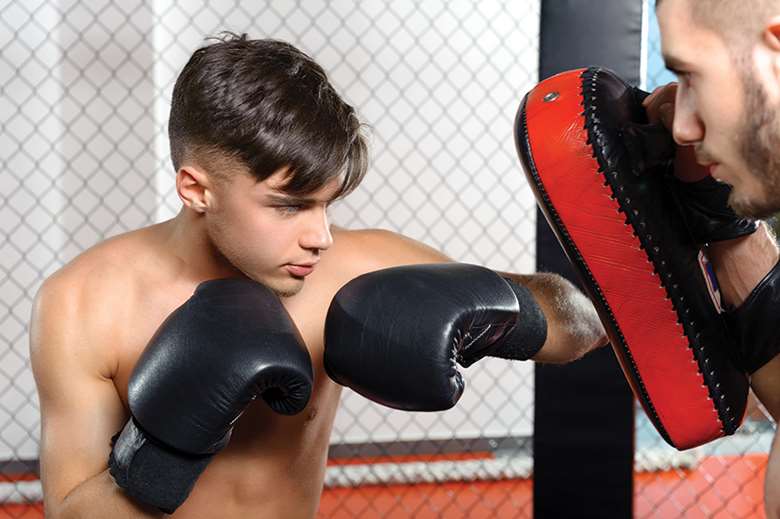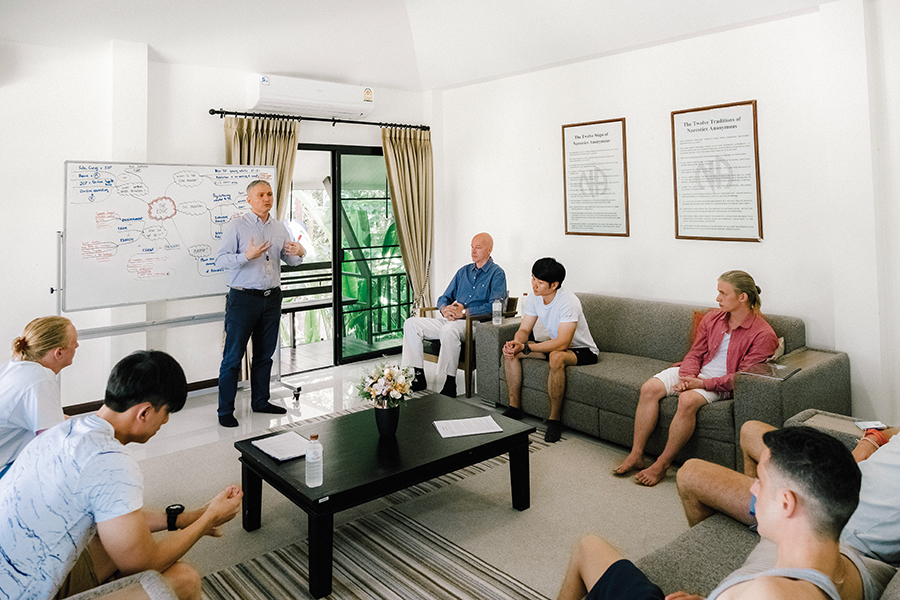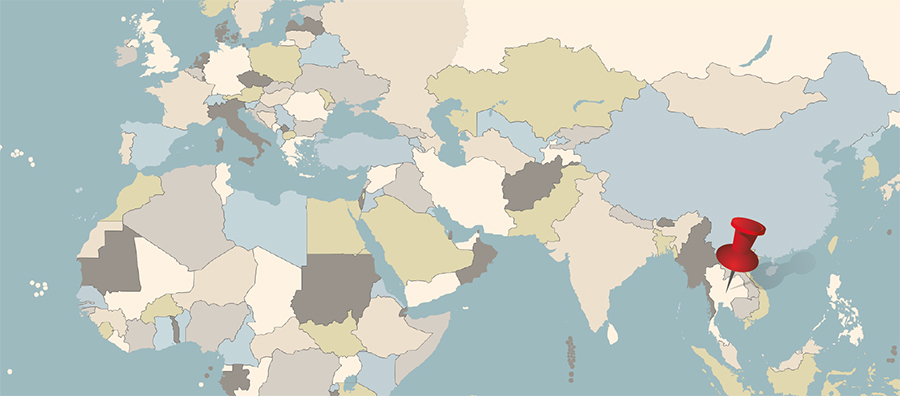Tackling addiction, Thailand
Derren Hayes and Sophie Eminson
Tuesday, September 25, 2018
How a rehabilitation centre in Thailand uses the ancient art of Thai boxing to help young people recover from addiction problems.

The use of physical activity as part of a drug rehabilitation programme is not particularly new. However, The Edge Rehabilitation Centre in Thailand has developed an approach that utilises the ancient art of Thai boxing to help young people aged 18 to 26 to recover physically and mentally from addiction problems.
CULTURE AND SOCIETY
Thailand has long been associated with the illegal drugs trade. Its proximity to the poppy fields in neighbouring Laos and Myanmar to the north saw it become a key route for heroin traffickers. In response, the Thai authorities focused enforcement activities on finding and destroying poppy fields and processing factories in its northern territories, to the point where by 2008, 80 per cent of poppy fields had been destroyed.
Most of the drugs being produced in Thailand are destined for shipment overseas, but some makes it onto the local "market".
A study conducted by epidemiologist Darika Saingam, a postdoctoral scholar at the Walter H. Shorenstein Asia-Pacific Research Center, estimated that 1.2 million Thais were involved in drug activities in 2014.
Up until recently, the Thai authorities had extremely harsh penalties for those convicted of drug activities, including the use of the death penalty for drug trafficking. However, a change in policy in 2016 saw the introduction of a more preventative approach, which emphasised the use of education and therapy for those convicted of possession.
The growth in tourism to Thailand in the past 20 years has also seen a number of specialist drug treatment programme providers establish facilities there. Most of these are for fee-paying overseas' clients. These have tended to be based around individual and group counselling sessions for those in their 30s and 40s. However, two years ago, The Edge established a programme specifically focused on the growing number of older male teens and young adults that needed help with addiction problems.
POLICY
The Global Commission on Drug Policy chose Thailand as the venue to unveil its annual report on drugs due to the country's late king committing to solving narcotics problems and the government's shift in drug policy to a more preventive approach.
Thailand's "zero-tolerance" approach to dealing with those involved in drugs had seen its prison population explode without significantly reducing the proliferation of illicit drugs.
Justice permanent secretary Charnchao Chaiyanukij said the country's new approach would consist of making drug rehabilitation accessible to everyone, and implementation of alternatives to imprisonment.
Draft legal changes emphasise rehabilitation over jail terms for drug users and mandate more proportional sentences. Marijuana or methamphetamine users in Thailand may get rehabilitation rather than jail under broad changes to the country's narcotics policy.
The legislative amendments also modify how culpability is determined, replacing mandatory sentences - in cases where the amounts seized exceed a designated threshold - with a rebuttable presumption of the intention to sell controlled drugs.
WHY MUAY THAI?
Muay Thai boxing dates back to the 18th century. It is a self-defence sport native to Thailand, Burma and Cambodia and is also known as "The Art of Eight Limbs". The eight limbs refer to strikes delivered by hands, lower legs, elbows and knees. However, it also includes the practice of meditation for focus and calm.
Muay Thai is the national sport of Thailand, and there are fights shown on the country's TV networks three times a week. Combatants, known as nak muay, fight in a ring wearing gloves.
Many of those recovering from addiction suffer with low self-esteem, but Muay Thai teaches self-discipline and has the ability to increase self-confidence. Adversity is overcome as the young person's self-esteem grows and they begin to think of themselves as an athlete instead of an addict.
Alastair Mordey, programme director at The Cabin Addiction Services Group, which developed The Edge programme, says the approach is not about fighting but "training, bonding, intimacy and transformation".
Muay Thai also provides an excellent physical workout because it uses almost every part of the body, is fun and improves discipline. Addiction recovery experts also say that it helps release stress and improve sleeping.

PRACTICE
A key element of the 28-day youth addiction programme run by The Edge is the use of physical stimulation as part of their therapy to reflect the fact that young men have shorter concentration spans and greater energy levels.
In addition to treating those with addiction problems, The Edge treats young men suffering from mental illness and behavioural issues. Located in the foothills of the city of Chiang Mai, in northern Thailand, it offers a treatment programme designed to keep young men engaged by combining, in equal amounts, physical activities with psychotherapy; as well as nutrition and mindfulness.
The programme, operated by The Cabin Group since 2016, was developed in response to an influx of young men at their inpatient rehab centre in Chiang Mai due to the "Ice" epidemic in Australia.
It combines elements of cognitive behavioural therapy and the 12 Steps mindfulness approach. Therapy sessions take place with a dedicated counsellor who remains with the client from the beginning to the end of treatment. Group therapy sessions are held daily, which gives participants the benefits and support of their fellowship and resources.
Multidisciplinary teams are made up of mental health and addiction counsellors, activity coaches/managers - in charge of Muay Thai, triathlon training and wilderness/adventure activities - holistic coaches, art therapist, physical fitness trainers, massage therapists, medical nurses and clinical support staff.
The Muay Thai training is done at a boxing gym off site by professional Muay Thai trainers who collaborate with the Edge to design a programme specifically for young people.
The Cabin Chiang Mai is licensed by Thailand's Ministry of Public Health as a substance addiction and behavioural health rehabilitation centre.
A typical day on the Edge programme starts with breakfast at 7am. Muay Thai or triathlon training will normally begin at 8.30am and last for more than two hours. An hour's group work will then take place before lunch at 12.30pm till 1.30pm. Individual counselling or therapy sessions take place in the afternoon following educational psychology or experiential work. Art therapy and sport activities are also a regular feature.
Following dinner, yoya or other holistic activities take place. There are also leisure activities until the 9.30pm curfew.
IMPACT AND PROGRESS
There is no Western research done on the therapeutic benefits of Muay Thai, however The Edge says the physical challenge of boxing and triathlon training is effective in creating purpose and dedication in the lives of young men.
The Edge uses The Cabin's Recovery Zones model, which has a highly successful 96 per cent completion rate.
The programme focuses on teaching young people practices - meditation, emotional freedom techniques, art therapy - that are self-help techniques that the participants can use to curb cravings, reduce anxiety, reduce stress levels and manage anger.
Mordey says elements of The Edge programme could be adopted in the UK by utilising boxing clubs that exist in inner city areas.
"This has already been tried by boys' clubs run by the local police in areas like Tottenham," he says. "Boxing fell out of favour as an intervention in the 1990s. I believe the tide is turning again. Alternatively, Brazilian jiu-jitsu is gaining in popularity and could equally be used to divert young men away from trouble."

FACTFILE
- Thai boxing has been incorporated into a programme to help young men recovering from addictions
- Learning the martial art helps build young people's physical and mental strength
- It also provides discipline and structure to the young person's recovery programme
- Daily Thai boxing and triathlon sessions make up part of a 28-day programme run by The Edge
- Thailand has traditionally had tough drug laws, but has developed a more therapeutic approach
- The approach the programme is modelled on has a high completion rate amongst participants
EXPERT VIEW
By Anthony York, chief executive, Boxing Futures
Although not a new concept, The Cabin Group should be commended on their Edge Programme, that uses Muay Thai boxing as part of their recovery programme. I have no doubt about the effectiveness of such programmes and firmly believe that governments should look at the facts and invest in them.
There's an ever-increasing body of evidence which demonstrates that using physical activity combined with therapeutic approaches such as mindfulness, cognitive behavioural therapy, mentoring and befriending and coaching has positive impacts on people's physical and more importantly mental wellbeing.
UK Charities like Boxing Futures and others like Fight for Peace, London Community Boxing, and Empire Fighting Chance to name a few, are all using combinations of therapeutic models to engage with a wide range of people. They all use boxing as a conduit/tool to engage people and promote positive behavioural change.
Boxing Futures has developed a particular expertise for working with vulnerable young people with wellbeing issues in secure psychiatric and community settings. Fight for Peace - which uses boxing and kick-boxing - has developed its five-pillar theory of change model, working with gangs and young people to prevent of youth violence. London Community Boxing and Empire Fighting Chance are both charities and England Boxing affiliated amateur boxing clubs, engaging with disadvantaged young people in their communities.
I commend Alistair Mordey for developing this initiative in Thailand and would like to learn more about these programmes.




